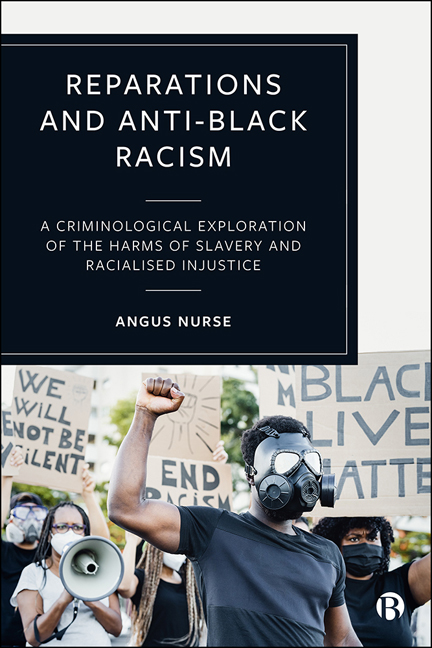 Reparations and Anti-Black Racism
Reparations and Anti-Black Racism Book contents
- Frontmatter
- Contents
- List of Abbreviations
- Acknowledgements
- Preface
- 1 Black Lives Matter: The Legacy of Slavery
- 2 Slavery and Reparations: A Criminological View
- 3 Reparations Litigation: An Overview
- 4 Victims of Slavery and Reparations: Who Suffers?
- 5 A Comparative Analysis of Reparations
- 6 Unjust Enrichment and the Socio-Legal Case for Reparations
- 7 The ‘Value’ of Reparations
- 8 The Nature of Reparations
- 9 Reparations in the 21st Century: Contemporary Debates and Issues on Reparations
- Appendix: Reparations Litigation and Settlements
- Notes
- References
- Index
7 - The ‘Value’ of Reparations
Published online by Cambridge University Press: 13 May 2022
- Frontmatter
- Contents
- List of Abbreviations
- Acknowledgements
- Preface
- 1 Black Lives Matter: The Legacy of Slavery
- 2 Slavery and Reparations: A Criminological View
- 3 Reparations Litigation: An Overview
- 4 Victims of Slavery and Reparations: Who Suffers?
- 5 A Comparative Analysis of Reparations
- 6 Unjust Enrichment and the Socio-Legal Case for Reparations
- 7 The ‘Value’ of Reparations
- 8 The Nature of Reparations
- 9 Reparations in the 21st Century: Contemporary Debates and Issues on Reparations
- Appendix: Reparations Litigation and Settlements
- Notes
- References
- Index
Summary
This chapter applies a criminological perspective to questions surrounding what is owed by way of reparations, combined with a critical examination of how value is assigned in respect of the harm caused by slavery and anti-Black racism.
Litigation and political arguments suggest that one mechanism for assessing the value owed to the descendants of slaves and their communities is by way of calculating the amount of wages that should have been paid in respect of unpaid labour carried out by slaves. Thus, a straightforward calculation can provide a notional value to serve as the basis for reparations. However, this chapter also extends the discussion of ‘value’ to consider the wider ‘cost’ of slavery and anti-Black racism and its relevance to the reparations debate in both narrow and wide sense. Calculating the wages of slaves and African Americans retained in indentured servitude following emancipation in the US provides for a straightforward mechanism for assigning value to the loss incurred to African Americans and/or their descendants or to Black Britons (and/or their descendants) who contributed to the British Empire but were marginalized in the process. The wider cost debate employs a zemiological approach that considers ‘cost’ in the wider sense of economic loss through social harm, missed opportunities and ongoing disadvantage. Wider conceptions of cost and value examine how Black citizens generally remain in the lower socio-economic brackets in both the US and UK and are arguably still denied access to some of the tools of social mobility.
This chapter also highlights how some aspects of inequality in some African and Caribbean states is arguably a consequence of slavery. Thus, this chapter argues for both narrow and wide conceptions of cost and value to be deployed in reparations discussions.
Criminological conceptions on value
This book's criminological perspective on reparations contends that the question of value extends beyond purely financial concerns and should also consider social justice and victimization issues (Magarrell, 2003; Miller and Kumar, 2007). Reparations can have an economic, legal, political and social or moral value, and arguably these objectives can also apply to the justification applied to reparations (Corlett, 2011).
- Type
- Chapter
- Information
- Reparations and Anti-Black RacismA Criminological Exploration of the Harms of Slavery and Racialised Injustice, pp. 85 - 96Publisher: Bristol University PressPrint publication year: 2021


